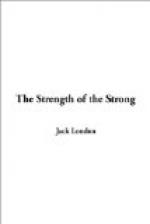The epidemic of shooting of New York City policemen was a remarkable affair. It became one of the horror mysteries of the time. In two short weeks over a hundred policemen were shot in the legs by their own revolvers. Inspector Jones did not solve the mystery, but it was his idea that finally outwitted Gluck. On his recommendation the policemen ceased carrying revolvers, and no more accidental shootings occurred.
It was in the early spring of 1940 that Gluck destroyed the Mare Island navy-yard. From a room in Vallejo he sent his electric discharges across the Vallejo Straits to Mare Island. He first played his flashes on the battleship Maryland. She lay at the dock of one of the mine-magazines. On her forward deck, on a huge temporary platform of timbers, were disposed over a hundred mines. These mines were for the defence of the Golden Gate. Any one of these mines was capable of destroying a dozen battleships, and there were over a hundred mines. The destruction was terrific, but it was only Gluck’s overture. He played his flashes down the Mare Island shore, blowing up five torpedo boats, the torpedo station, and the great magazine at the eastern end of the island. Returning westward again, and scooping in occasional isolated magazines on the high ground back from the shore, he blew up three cruisers and the battleships Oregon, Delaware, New Hampshire, and Florida—the latter had just gone into dry-dock, and the magnificent dry-dock was destroyed along with her.
It was a frightful catastrophe, and a shiver of horror passed through the land. But it was nothing to what was to follow. In the late fall of that year Emil Gluck made a clean sweep of the Atlantic seaboard from Maine to Florida. Nothing escaped. Forts, mines, coast defences of all sorts, torpedo stations, magazines— everything went up. Three months afterward, in midwinter, he smote the north shore of the Mediterranean from Gibraltar to Greece in the same stupefying manner. A wail went up from the nations. It was clear that human agency was behind all this destruction, and it was equally clear, through Emil Gluck’s impartiality, that the destruction was not the work of any particular nation. One thing was patent, namely, that whoever was the human behind it all, that human was a menace to the world. No nation was safe. There was no defence against this unknown and all-powerful foe. Warfare was futile—nay, not merely futile but itself the very essence of the peril. For a twelve-month the manufacture of powder ceased, and all soldiers and sailors were withdrawn from all fortifications and war vessels. And even a world-disarmament was seriously considered at the Convention of the Powers, held at The Hague at that time.




